Organisational Behaviour Report: Culture, Motivation, Teams at Tesco
VerifiedAdded on 2020/10/22
|15
|4967
|53
Report
AI Summary
This report provides an in-depth analysis of organisational behaviour within Tesco, a retail giant. It begins with an examination of organisational culture, power dynamics, and political influences, evaluating Tesco's culture through Handy's Typologies and exploring different types of power. The report then delves into motivation theories, differentiating between content and process theories, with a particular focus on Maslow's hierarchy of needs and Vroom's expectancy theory. The study continues with an assessment of team effectiveness, identifying different team types and factors that contribute to high performance. Furthermore, the report discusses concepts and philosophies of organisational behaviour, including emotional intelligence and the importance of soft skills. The analysis integrates relevant theories and concepts to provide a comprehensive understanding of Tesco's organisational behaviour and its implications for employee performance and company success. It also highlights the significance of network and system theory within the organization. The report concludes by synthesizing the key findings and offering insights into how Tesco can further enhance its organisational strategies.
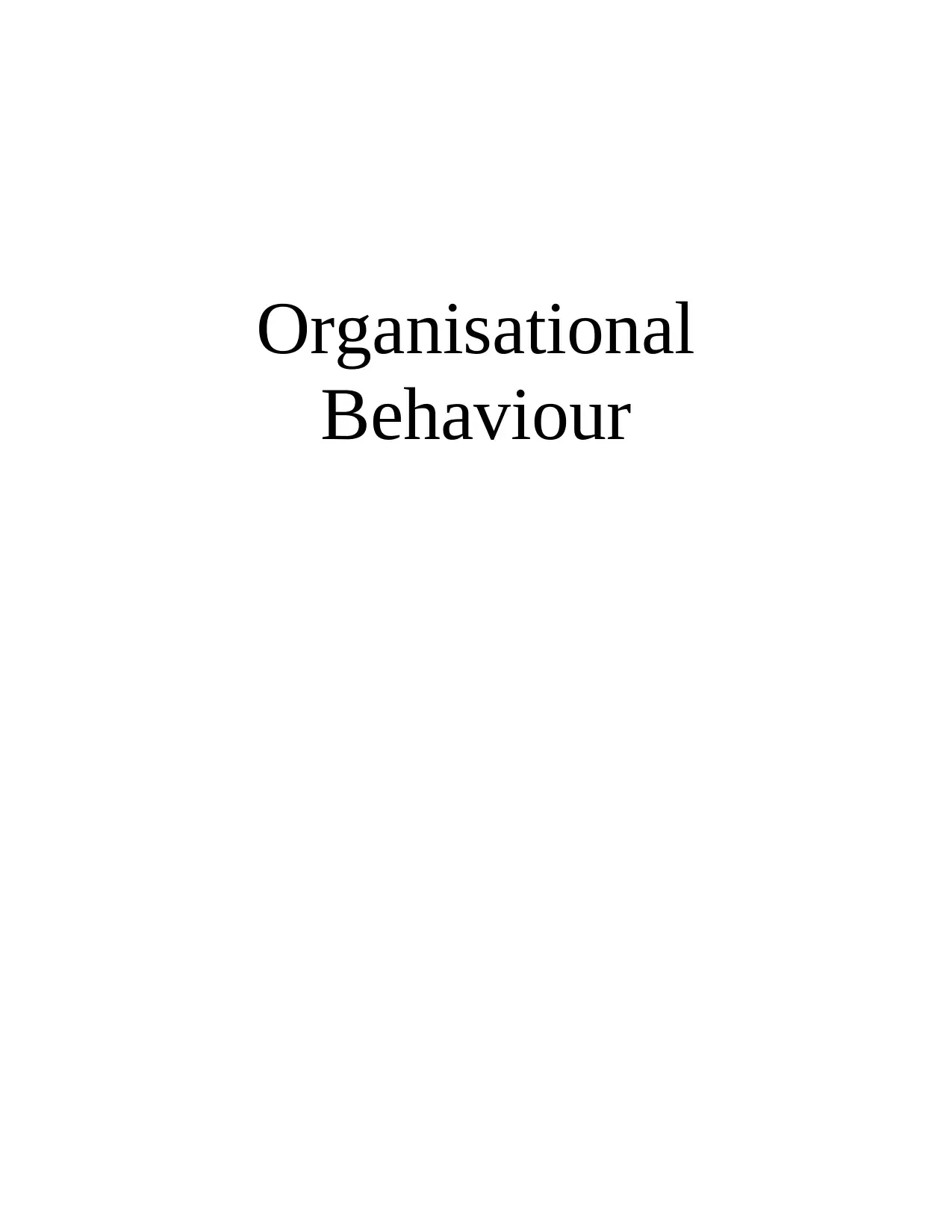
Organisational
Behaviour
Behaviour
Paraphrase This Document
Need a fresh take? Get an instant paraphrase of this document with our AI Paraphraser
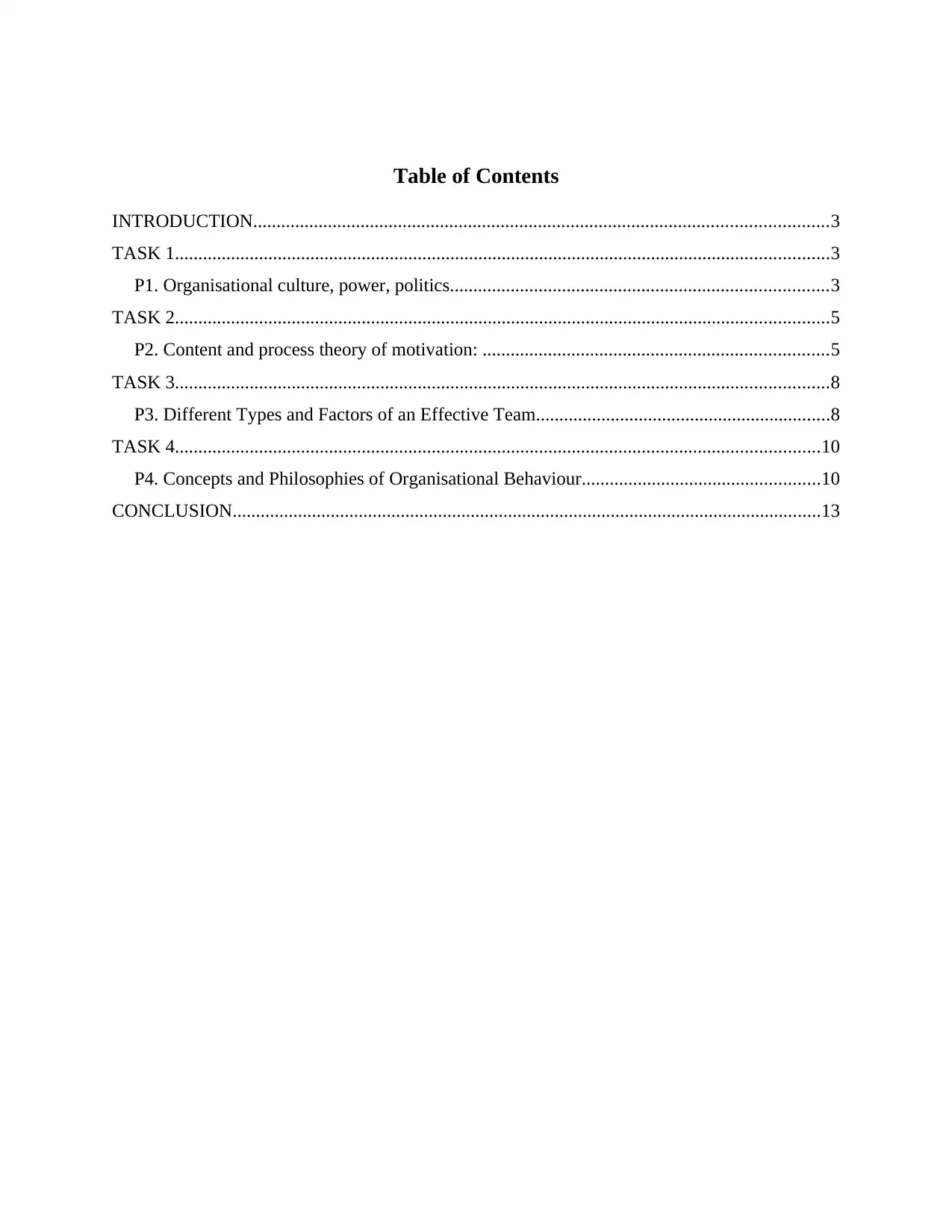
Table of Contents
INTRODUCTION...........................................................................................................................3
TASK 1............................................................................................................................................3
P1. Organisational culture, power, politics.................................................................................3
TASK 2............................................................................................................................................5
P2. Content and process theory of motivation: ..........................................................................5
TASK 3............................................................................................................................................8
P3. Different Types and Factors of an Effective Team...............................................................8
TASK 4..........................................................................................................................................10
P4. Concepts and Philosophies of Organisational Behaviour...................................................10
CONCLUSION..............................................................................................................................13
INTRODUCTION...........................................................................................................................3
TASK 1............................................................................................................................................3
P1. Organisational culture, power, politics.................................................................................3
TASK 2............................................................................................................................................5
P2. Content and process theory of motivation: ..........................................................................5
TASK 3............................................................................................................................................8
P3. Different Types and Factors of an Effective Team...............................................................8
TASK 4..........................................................................................................................................10
P4. Concepts and Philosophies of Organisational Behaviour...................................................10
CONCLUSION..............................................................................................................................13
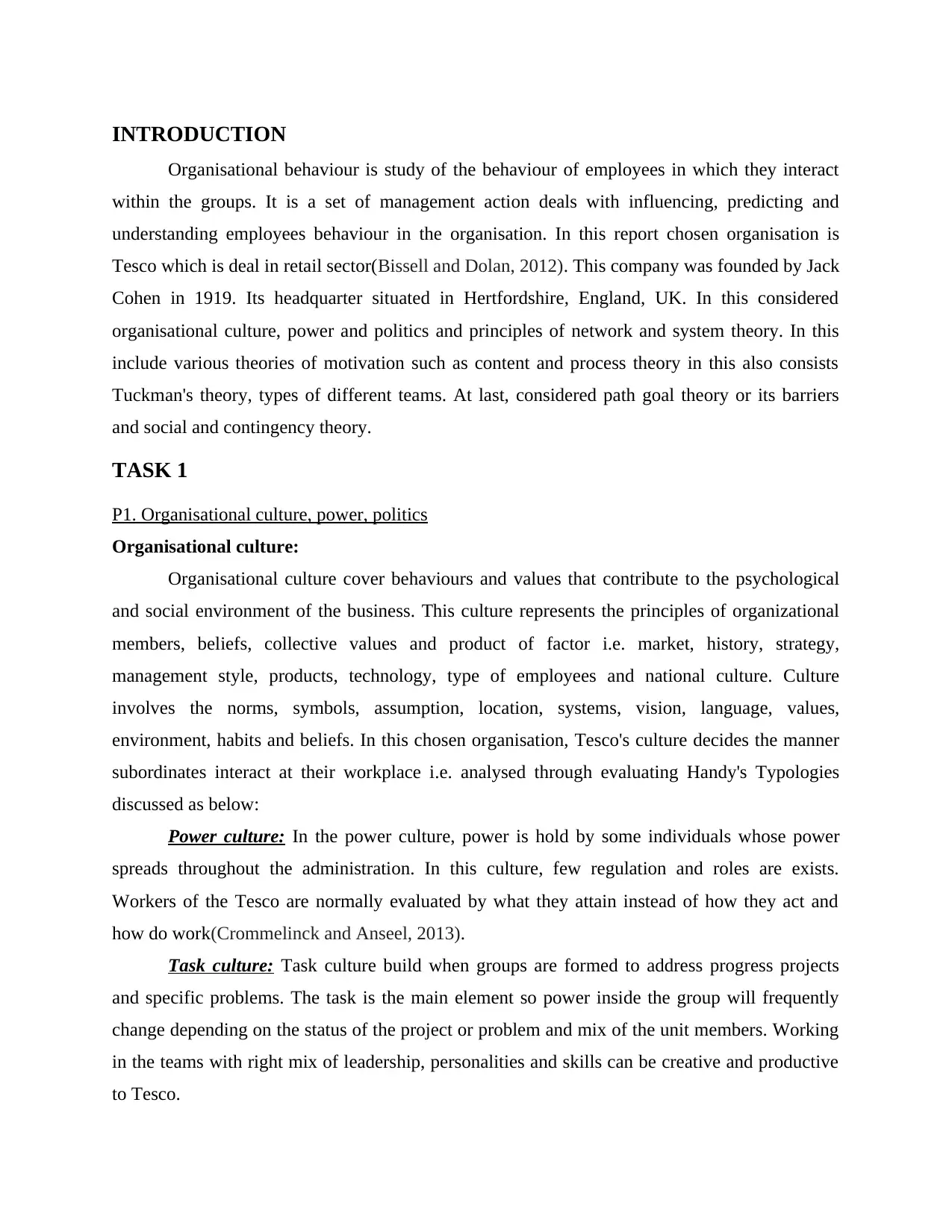
INTRODUCTION
Organisational behaviour is study of the behaviour of employees in which they interact
within the groups. It is a set of management action deals with influencing, predicting and
understanding employees behaviour in the organisation. In this report chosen organisation is
Tesco which is deal in retail sector(Bissell and Dolan, 2012). This company was founded by Jack
Cohen in 1919. Its headquarter situated in Hertfordshire, England, UK. In this considered
organisational culture, power and politics and principles of network and system theory. In this
include various theories of motivation such as content and process theory in this also consists
Tuckman's theory, types of different teams. At last, considered path goal theory or its barriers
and social and contingency theory.
TASK 1
P1. Organisational culture, power, politics
Organisational culture:
Organisational culture cover behaviours and values that contribute to the psychological
and social environment of the business. This culture represents the principles of organizational
members, beliefs, collective values and product of factor i.e. market, history, strategy,
management style, products, technology, type of employees and national culture. Culture
involves the norms, symbols, assumption, location, systems, vision, language, values,
environment, habits and beliefs. In this chosen organisation, Tesco's culture decides the manner
subordinates interact at their workplace i.e. analysed through evaluating Handy's Typologies
discussed as below:
Power culture: In the power culture, power is hold by some individuals whose power
spreads throughout the administration. In this culture, few regulation and roles are exists.
Workers of the Tesco are normally evaluated by what they attain instead of how they act and
how do work(Crommelinck and Anseel, 2013).
Task culture: Task culture build when groups are formed to address progress projects
and specific problems. The task is the main element so power inside the group will frequently
change depending on the status of the project or problem and mix of the unit members. Working
in the teams with right mix of leadership, personalities and skills can be creative and productive
to Tesco.
Organisational behaviour is study of the behaviour of employees in which they interact
within the groups. It is a set of management action deals with influencing, predicting and
understanding employees behaviour in the organisation. In this report chosen organisation is
Tesco which is deal in retail sector(Bissell and Dolan, 2012). This company was founded by Jack
Cohen in 1919. Its headquarter situated in Hertfordshire, England, UK. In this considered
organisational culture, power and politics and principles of network and system theory. In this
include various theories of motivation such as content and process theory in this also consists
Tuckman's theory, types of different teams. At last, considered path goal theory or its barriers
and social and contingency theory.
TASK 1
P1. Organisational culture, power, politics
Organisational culture:
Organisational culture cover behaviours and values that contribute to the psychological
and social environment of the business. This culture represents the principles of organizational
members, beliefs, collective values and product of factor i.e. market, history, strategy,
management style, products, technology, type of employees and national culture. Culture
involves the norms, symbols, assumption, location, systems, vision, language, values,
environment, habits and beliefs. In this chosen organisation, Tesco's culture decides the manner
subordinates interact at their workplace i.e. analysed through evaluating Handy's Typologies
discussed as below:
Power culture: In the power culture, power is hold by some individuals whose power
spreads throughout the administration. In this culture, few regulation and roles are exists.
Workers of the Tesco are normally evaluated by what they attain instead of how they act and
how do work(Crommelinck and Anseel, 2013).
Task culture: Task culture build when groups are formed to address progress projects
and specific problems. The task is the main element so power inside the group will frequently
change depending on the status of the project or problem and mix of the unit members. Working
in the teams with right mix of leadership, personalities and skills can be creative and productive
to Tesco.
⊘ This is a preview!⊘
Do you want full access?
Subscribe today to unlock all pages.

Trusted by 1+ million students worldwide
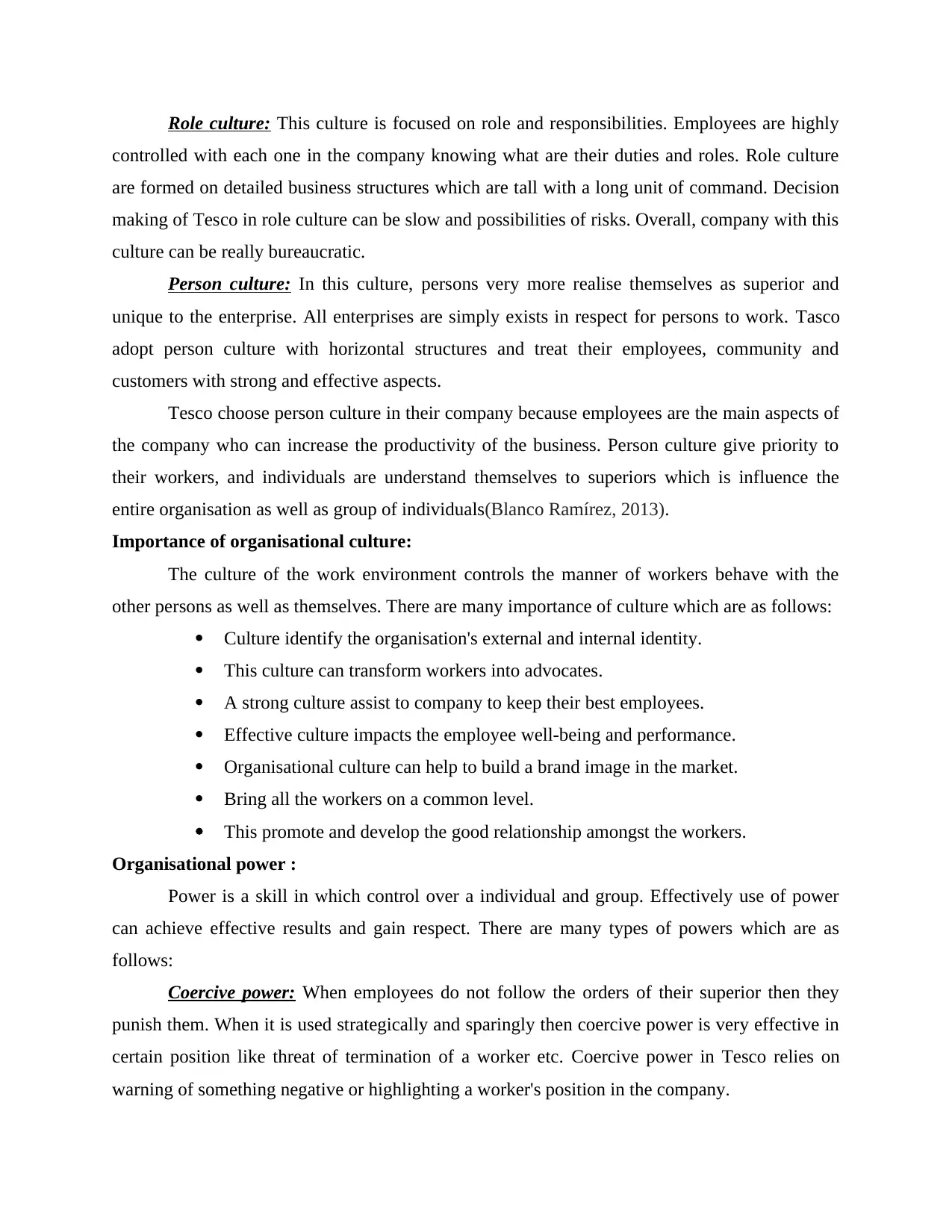
Role culture: This culture is focused on role and responsibilities. Employees are highly
controlled with each one in the company knowing what are their duties and roles. Role culture
are formed on detailed business structures which are tall with a long unit of command. Decision
making of Tesco in role culture can be slow and possibilities of risks. Overall, company with this
culture can be really bureaucratic.
Person culture: In this culture, persons very more realise themselves as superior and
unique to the enterprise. All enterprises are simply exists in respect for persons to work. Tasco
adopt person culture with horizontal structures and treat their employees, community and
customers with strong and effective aspects.
Tesco choose person culture in their company because employees are the main aspects of
the company who can increase the productivity of the business. Person culture give priority to
their workers, and individuals are understand themselves to superiors which is influence the
entire organisation as well as group of individuals(Blanco Ramírez, 2013).
Importance of organisational culture:
The culture of the work environment controls the manner of workers behave with the
other persons as well as themselves. There are many importance of culture which are as follows:
Culture identify the organisation's external and internal identity.
This culture can transform workers into advocates.
A strong culture assist to company to keep their best employees.
Effective culture impacts the employee well-being and performance.
Organisational culture can help to build a brand image in the market.
Bring all the workers on a common level.
This promote and develop the good relationship amongst the workers.
Organisational power :
Power is a skill in which control over a individual and group. Effectively use of power
can achieve effective results and gain respect. There are many types of powers which are as
follows:
Coercive power: When employees do not follow the orders of their superior then they
punish them. When it is used strategically and sparingly then coercive power is very effective in
certain position like threat of termination of a worker etc. Coercive power in Tesco relies on
warning of something negative or highlighting a worker's position in the company.
controlled with each one in the company knowing what are their duties and roles. Role culture
are formed on detailed business structures which are tall with a long unit of command. Decision
making of Tesco in role culture can be slow and possibilities of risks. Overall, company with this
culture can be really bureaucratic.
Person culture: In this culture, persons very more realise themselves as superior and
unique to the enterprise. All enterprises are simply exists in respect for persons to work. Tasco
adopt person culture with horizontal structures and treat their employees, community and
customers with strong and effective aspects.
Tesco choose person culture in their company because employees are the main aspects of
the company who can increase the productivity of the business. Person culture give priority to
their workers, and individuals are understand themselves to superiors which is influence the
entire organisation as well as group of individuals(Blanco Ramírez, 2013).
Importance of organisational culture:
The culture of the work environment controls the manner of workers behave with the
other persons as well as themselves. There are many importance of culture which are as follows:
Culture identify the organisation's external and internal identity.
This culture can transform workers into advocates.
A strong culture assist to company to keep their best employees.
Effective culture impacts the employee well-being and performance.
Organisational culture can help to build a brand image in the market.
Bring all the workers on a common level.
This promote and develop the good relationship amongst the workers.
Organisational power :
Power is a skill in which control over a individual and group. Effectively use of power
can achieve effective results and gain respect. There are many types of powers which are as
follows:
Coercive power: When employees do not follow the orders of their superior then they
punish them. When it is used strategically and sparingly then coercive power is very effective in
certain position like threat of termination of a worker etc. Coercive power in Tesco relies on
warning of something negative or highlighting a worker's position in the company.
Paraphrase This Document
Need a fresh take? Get an instant paraphrase of this document with our AI Paraphraser
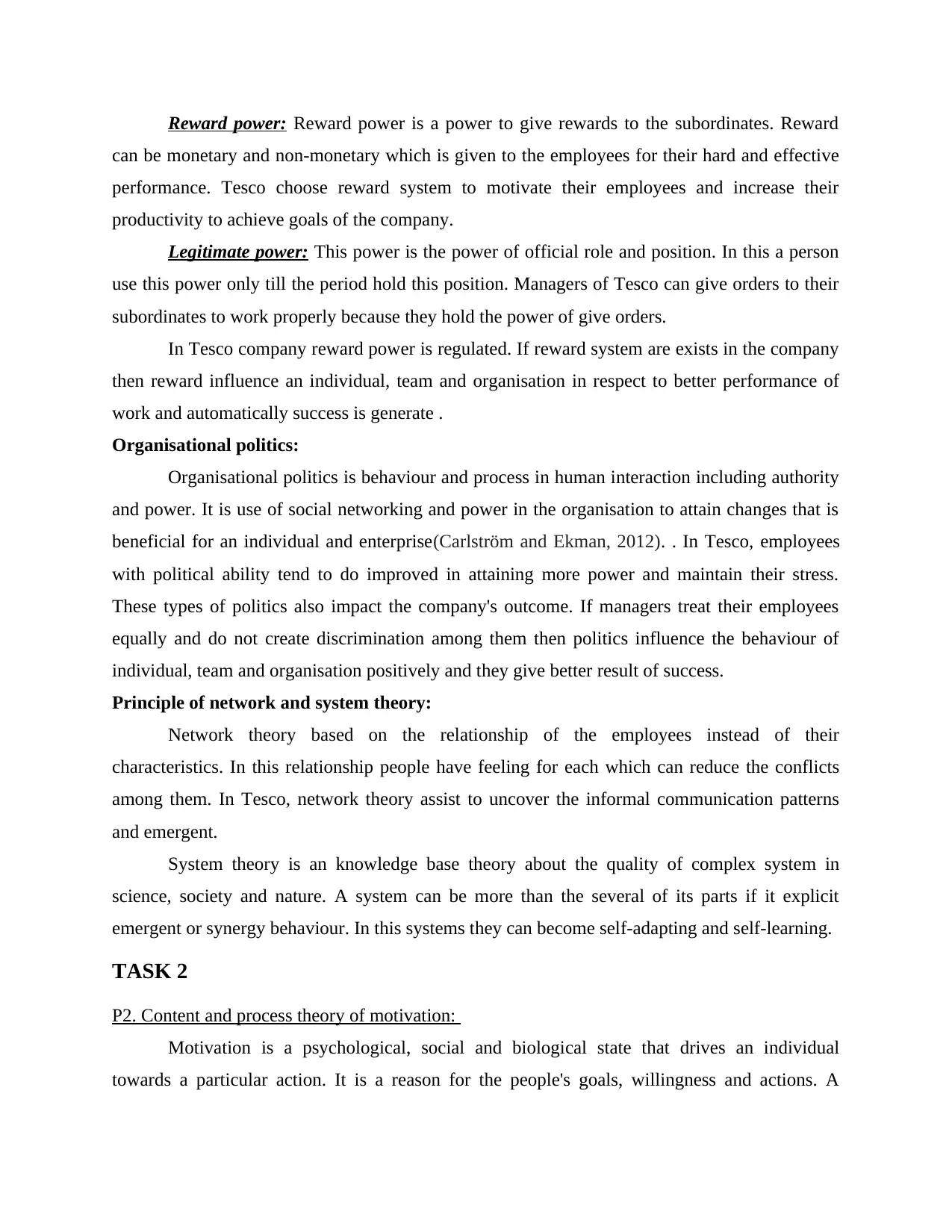
Reward power: Reward power is a power to give rewards to the subordinates. Reward
can be monetary and non-monetary which is given to the employees for their hard and effective
performance. Tesco choose reward system to motivate their employees and increase their
productivity to achieve goals of the company.
Legitimate power: This power is the power of official role and position. In this a person
use this power only till the period hold this position. Managers of Tesco can give orders to their
subordinates to work properly because they hold the power of give orders.
In Tesco company reward power is regulated. If reward system are exists in the company
then reward influence an individual, team and organisation in respect to better performance of
work and automatically success is generate .
Organisational politics:
Organisational politics is behaviour and process in human interaction including authority
and power. It is use of social networking and power in the organisation to attain changes that is
beneficial for an individual and enterprise(Carlström and Ekman, 2012). . In Tesco, employees
with political ability tend to do improved in attaining more power and maintain their stress.
These types of politics also impact the company's outcome. If managers treat their employees
equally and do not create discrimination among them then politics influence the behaviour of
individual, team and organisation positively and they give better result of success.
Principle of network and system theory:
Network theory based on the relationship of the employees instead of their
characteristics. In this relationship people have feeling for each which can reduce the conflicts
among them. In Tesco, network theory assist to uncover the informal communication patterns
and emergent.
System theory is an knowledge base theory about the quality of complex system in
science, society and nature. A system can be more than the several of its parts if it explicit
emergent or synergy behaviour. In this systems they can become self-adapting and self-learning.
TASK 2
P2. Content and process theory of motivation:
Motivation is a psychological, social and biological state that drives an individual
towards a particular action. It is a reason for the people's goals, willingness and actions. A
can be monetary and non-monetary which is given to the employees for their hard and effective
performance. Tesco choose reward system to motivate their employees and increase their
productivity to achieve goals of the company.
Legitimate power: This power is the power of official role and position. In this a person
use this power only till the period hold this position. Managers of Tesco can give orders to their
subordinates to work properly because they hold the power of give orders.
In Tesco company reward power is regulated. If reward system are exists in the company
then reward influence an individual, team and organisation in respect to better performance of
work and automatically success is generate .
Organisational politics:
Organisational politics is behaviour and process in human interaction including authority
and power. It is use of social networking and power in the organisation to attain changes that is
beneficial for an individual and enterprise(Carlström and Ekman, 2012). . In Tesco, employees
with political ability tend to do improved in attaining more power and maintain their stress.
These types of politics also impact the company's outcome. If managers treat their employees
equally and do not create discrimination among them then politics influence the behaviour of
individual, team and organisation positively and they give better result of success.
Principle of network and system theory:
Network theory based on the relationship of the employees instead of their
characteristics. In this relationship people have feeling for each which can reduce the conflicts
among them. In Tesco, network theory assist to uncover the informal communication patterns
and emergent.
System theory is an knowledge base theory about the quality of complex system in
science, society and nature. A system can be more than the several of its parts if it explicit
emergent or synergy behaviour. In this systems they can become self-adapting and self-learning.
TASK 2
P2. Content and process theory of motivation:
Motivation is a psychological, social and biological state that drives an individual
towards a particular action. It is a reason for the people's goals, willingness and actions. A
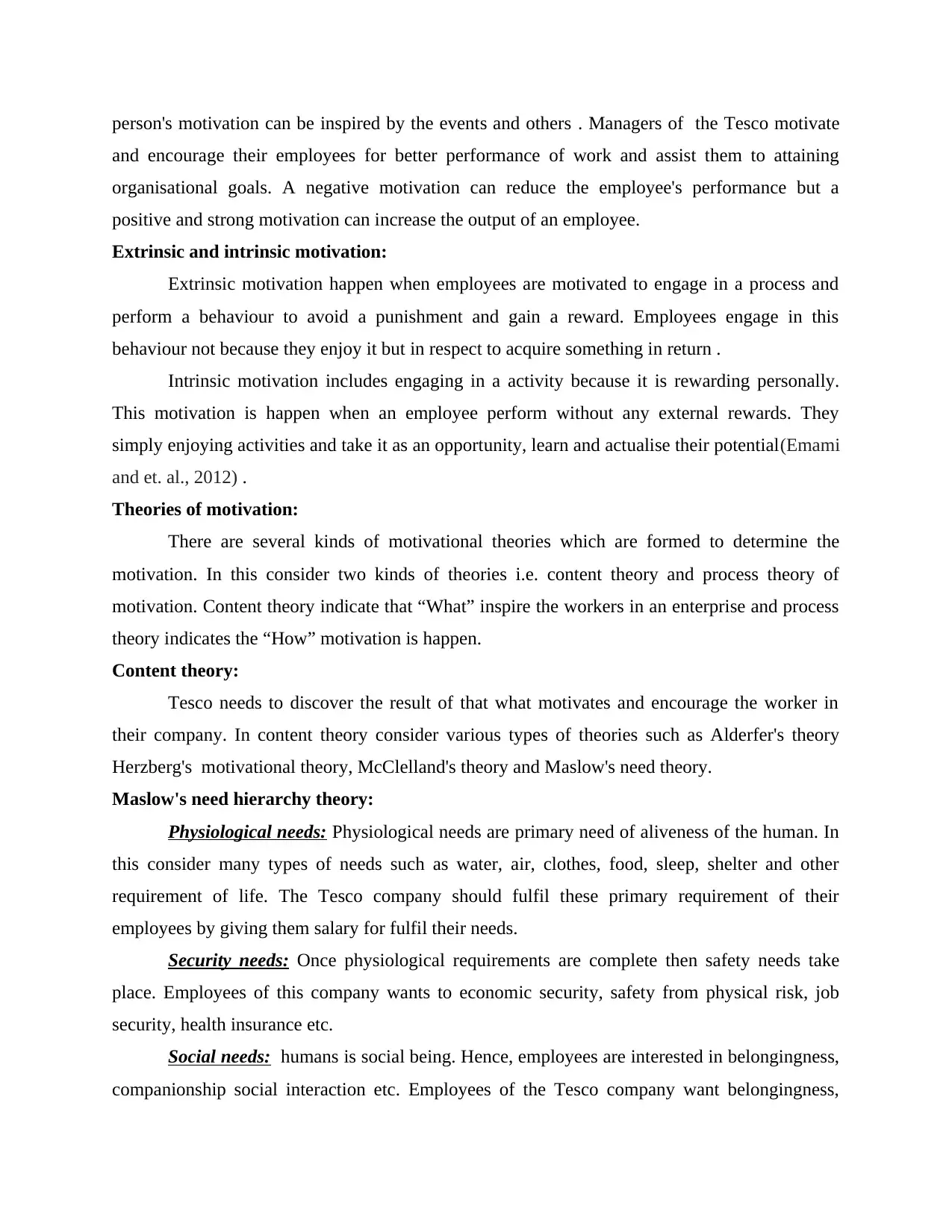
person's motivation can be inspired by the events and others . Managers of the Tesco motivate
and encourage their employees for better performance of work and assist them to attaining
organisational goals. A negative motivation can reduce the employee's performance but a
positive and strong motivation can increase the output of an employee.
Extrinsic and intrinsic motivation:
Extrinsic motivation happen when employees are motivated to engage in a process and
perform a behaviour to avoid a punishment and gain a reward. Employees engage in this
behaviour not because they enjoy it but in respect to acquire something in return .
Intrinsic motivation includes engaging in a activity because it is rewarding personally.
This motivation is happen when an employee perform without any external rewards. They
simply enjoying activities and take it as an opportunity, learn and actualise their potential(Emami
and et. al., 2012) .
Theories of motivation:
There are several kinds of motivational theories which are formed to determine the
motivation. In this consider two kinds of theories i.e. content theory and process theory of
motivation. Content theory indicate that “What” inspire the workers in an enterprise and process
theory indicates the “How” motivation is happen.
Content theory:
Tesco needs to discover the result of that what motivates and encourage the worker in
their company. In content theory consider various types of theories such as Alderfer's theory
Herzberg's motivational theory, McClelland's theory and Maslow's need theory.
Maslow's need hierarchy theory:
Physiological needs: Physiological needs are primary need of aliveness of the human. In
this consider many types of needs such as water, air, clothes, food, sleep, shelter and other
requirement of life. The Tesco company should fulfil these primary requirement of their
employees by giving them salary for fulfil their needs.
Security needs: Once physiological requirements are complete then safety needs take
place. Employees of this company wants to economic security, safety from physical risk, job
security, health insurance etc.
Social needs: humans is social being. Hence, employees are interested in belongingness,
companionship social interaction etc. Employees of the Tesco company want belongingness,
and encourage their employees for better performance of work and assist them to attaining
organisational goals. A negative motivation can reduce the employee's performance but a
positive and strong motivation can increase the output of an employee.
Extrinsic and intrinsic motivation:
Extrinsic motivation happen when employees are motivated to engage in a process and
perform a behaviour to avoid a punishment and gain a reward. Employees engage in this
behaviour not because they enjoy it but in respect to acquire something in return .
Intrinsic motivation includes engaging in a activity because it is rewarding personally.
This motivation is happen when an employee perform without any external rewards. They
simply enjoying activities and take it as an opportunity, learn and actualise their potential(Emami
and et. al., 2012) .
Theories of motivation:
There are several kinds of motivational theories which are formed to determine the
motivation. In this consider two kinds of theories i.e. content theory and process theory of
motivation. Content theory indicate that “What” inspire the workers in an enterprise and process
theory indicates the “How” motivation is happen.
Content theory:
Tesco needs to discover the result of that what motivates and encourage the worker in
their company. In content theory consider various types of theories such as Alderfer's theory
Herzberg's motivational theory, McClelland's theory and Maslow's need theory.
Maslow's need hierarchy theory:
Physiological needs: Physiological needs are primary need of aliveness of the human. In
this consider many types of needs such as water, air, clothes, food, sleep, shelter and other
requirement of life. The Tesco company should fulfil these primary requirement of their
employees by giving them salary for fulfil their needs.
Security needs: Once physiological requirements are complete then safety needs take
place. Employees of this company wants to economic security, safety from physical risk, job
security, health insurance etc.
Social needs: humans is social being. Hence, employees are interested in belongingness,
companionship social interaction etc. Employees of the Tesco company want belongingness,
⊘ This is a preview!⊘
Do you want full access?
Subscribe today to unlock all pages.

Trusted by 1+ million students worldwide
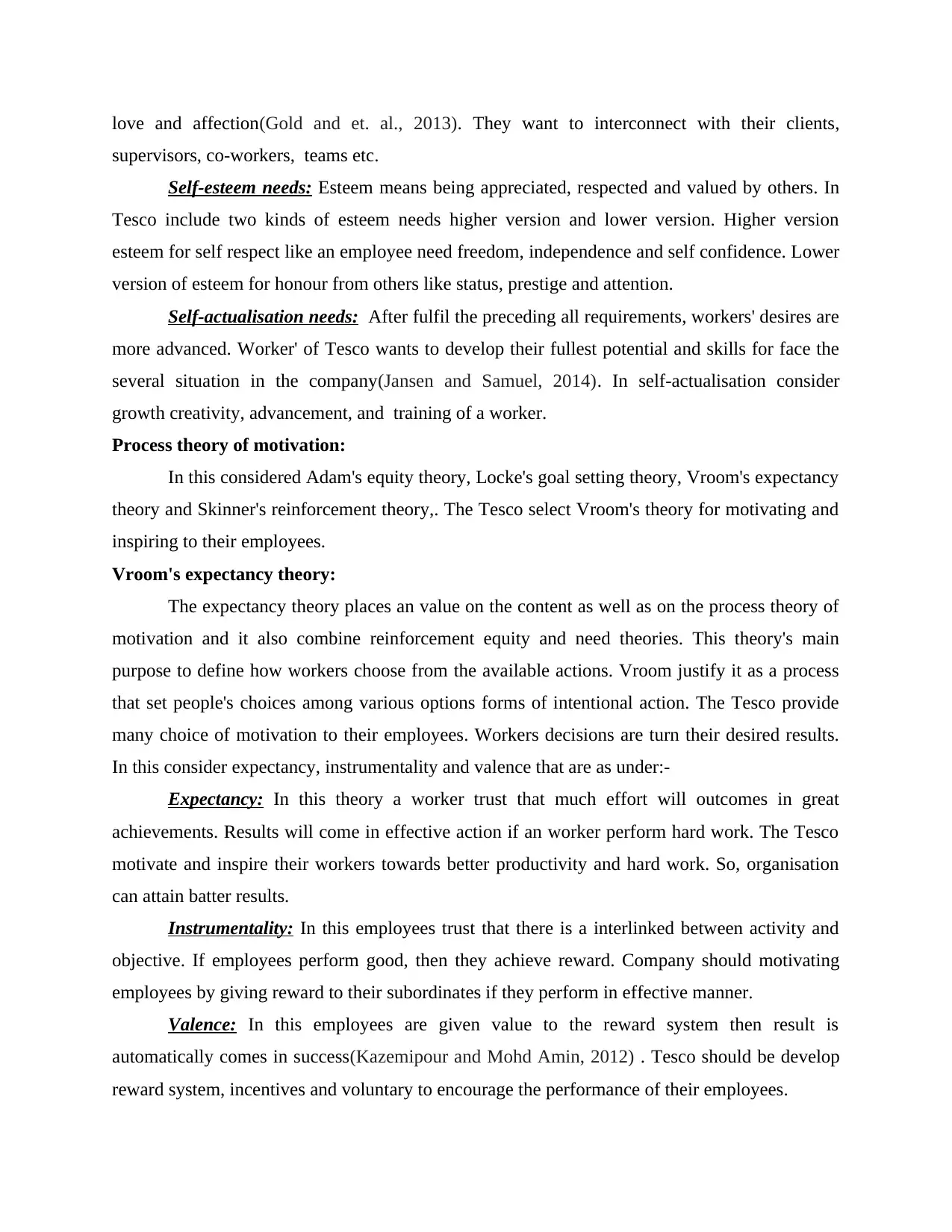
love and affection(Gold and et. al., 2013). They want to interconnect with their clients,
supervisors, co-workers, teams etc.
Self-esteem needs: Esteem means being appreciated, respected and valued by others. In
Tesco include two kinds of esteem needs higher version and lower version. Higher version
esteem for self respect like an employee need freedom, independence and self confidence. Lower
version of esteem for honour from others like status, prestige and attention.
Self-actualisation needs: After fulfil the preceding all requirements, workers' desires are
more advanced. Worker' of Tesco wants to develop their fullest potential and skills for face the
several situation in the company(Jansen and Samuel, 2014). In self-actualisation consider
growth creativity, advancement, and training of a worker.
Process theory of motivation:
In this considered Adam's equity theory, Locke's goal setting theory, Vroom's expectancy
theory and Skinner's reinforcement theory,. The Tesco select Vroom's theory for motivating and
inspiring to their employees.
Vroom's expectancy theory:
The expectancy theory places an value on the content as well as on the process theory of
motivation and it also combine reinforcement equity and need theories. This theory's main
purpose to define how workers choose from the available actions. Vroom justify it as a process
that set people's choices among various options forms of intentional action. The Tesco provide
many choice of motivation to their employees. Workers decisions are turn their desired results.
In this consider expectancy, instrumentality and valence that are as under:-
Expectancy: In this theory a worker trust that much effort will outcomes in great
achievements. Results will come in effective action if an worker perform hard work. The Tesco
motivate and inspire their workers towards better productivity and hard work. So, organisation
can attain batter results.
Instrumentality: In this employees trust that there is a interlinked between activity and
objective. If employees perform good, then they achieve reward. Company should motivating
employees by giving reward to their subordinates if they perform in effective manner.
Valence: In this employees are given value to the reward system then result is
automatically comes in success(Kazemipour and Mohd Amin, 2012) . Tesco should be develop
reward system, incentives and voluntary to encourage the performance of their employees.
supervisors, co-workers, teams etc.
Self-esteem needs: Esteem means being appreciated, respected and valued by others. In
Tesco include two kinds of esteem needs higher version and lower version. Higher version
esteem for self respect like an employee need freedom, independence and self confidence. Lower
version of esteem for honour from others like status, prestige and attention.
Self-actualisation needs: After fulfil the preceding all requirements, workers' desires are
more advanced. Worker' of Tesco wants to develop their fullest potential and skills for face the
several situation in the company(Jansen and Samuel, 2014). In self-actualisation consider
growth creativity, advancement, and training of a worker.
Process theory of motivation:
In this considered Adam's equity theory, Locke's goal setting theory, Vroom's expectancy
theory and Skinner's reinforcement theory,. The Tesco select Vroom's theory for motivating and
inspiring to their employees.
Vroom's expectancy theory:
The expectancy theory places an value on the content as well as on the process theory of
motivation and it also combine reinforcement equity and need theories. This theory's main
purpose to define how workers choose from the available actions. Vroom justify it as a process
that set people's choices among various options forms of intentional action. The Tesco provide
many choice of motivation to their employees. Workers decisions are turn their desired results.
In this consider expectancy, instrumentality and valence that are as under:-
Expectancy: In this theory a worker trust that much effort will outcomes in great
achievements. Results will come in effective action if an worker perform hard work. The Tesco
motivate and inspire their workers towards better productivity and hard work. So, organisation
can attain batter results.
Instrumentality: In this employees trust that there is a interlinked between activity and
objective. If employees perform good, then they achieve reward. Company should motivating
employees by giving reward to their subordinates if they perform in effective manner.
Valence: In this employees are given value to the reward system then result is
automatically comes in success(Kazemipour and Mohd Amin, 2012) . Tesco should be develop
reward system, incentives and voluntary to encourage the performance of their employees.
Paraphrase This Document
Need a fresh take? Get an instant paraphrase of this document with our AI Paraphraser
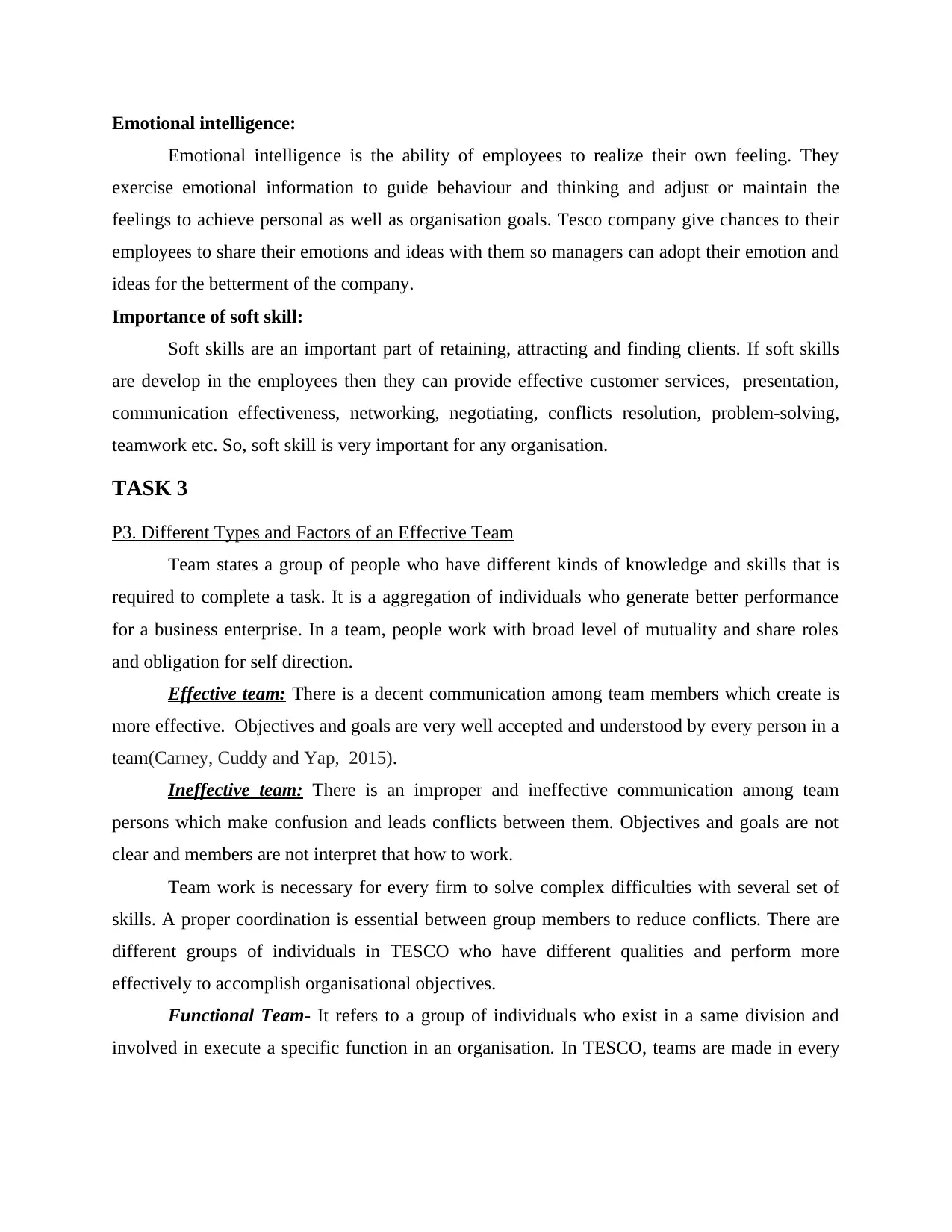
Emotional intelligence:
Emotional intelligence is the ability of employees to realize their own feeling. They
exercise emotional information to guide behaviour and thinking and adjust or maintain the
feelings to achieve personal as well as organisation goals. Tesco company give chances to their
employees to share their emotions and ideas with them so managers can adopt their emotion and
ideas for the betterment of the company.
Importance of soft skill:
Soft skills are an important part of retaining, attracting and finding clients. If soft skills
are develop in the employees then they can provide effective customer services, presentation,
communication effectiveness, networking, negotiating, conflicts resolution, problem-solving,
teamwork etc. So, soft skill is very important for any organisation.
TASK 3
P3. Different Types and Factors of an Effective Team
Team states a group of people who have different kinds of knowledge and skills that is
required to complete a task. It is a aggregation of individuals who generate better performance
for a business enterprise. In a team, people work with broad level of mutuality and share roles
and obligation for self direction.
Effective team: There is a decent communication among team members which create is
more effective. Objectives and goals are very well accepted and understood by every person in a
team(Carney, Cuddy and Yap, 2015).
Ineffective team: There is an improper and ineffective communication among team
persons which make confusion and leads conflicts between them. Objectives and goals are not
clear and members are not interpret that how to work.
Team work is necessary for every firm to solve complex difficulties with several set of
skills. A proper coordination is essential between group members to reduce conflicts. There are
different groups of individuals in TESCO who have different qualities and perform more
effectively to accomplish organisational objectives.
Functional Team- It refers to a group of individuals who exist in a same division and
involved in execute a specific function in an organisation. In TESCO, teams are made in every
Emotional intelligence is the ability of employees to realize their own feeling. They
exercise emotional information to guide behaviour and thinking and adjust or maintain the
feelings to achieve personal as well as organisation goals. Tesco company give chances to their
employees to share their emotions and ideas with them so managers can adopt their emotion and
ideas for the betterment of the company.
Importance of soft skill:
Soft skills are an important part of retaining, attracting and finding clients. If soft skills
are develop in the employees then they can provide effective customer services, presentation,
communication effectiveness, networking, negotiating, conflicts resolution, problem-solving,
teamwork etc. So, soft skill is very important for any organisation.
TASK 3
P3. Different Types and Factors of an Effective Team
Team states a group of people who have different kinds of knowledge and skills that is
required to complete a task. It is a aggregation of individuals who generate better performance
for a business enterprise. In a team, people work with broad level of mutuality and share roles
and obligation for self direction.
Effective team: There is a decent communication among team members which create is
more effective. Objectives and goals are very well accepted and understood by every person in a
team(Carney, Cuddy and Yap, 2015).
Ineffective team: There is an improper and ineffective communication among team
persons which make confusion and leads conflicts between them. Objectives and goals are not
clear and members are not interpret that how to work.
Team work is necessary for every firm to solve complex difficulties with several set of
skills. A proper coordination is essential between group members to reduce conflicts. There are
different groups of individuals in TESCO who have different qualities and perform more
effectively to accomplish organisational objectives.
Functional Team- It refers to a group of individuals who exist in a same division and
involved in execute a specific function in an organisation. In TESCO, teams are made in every
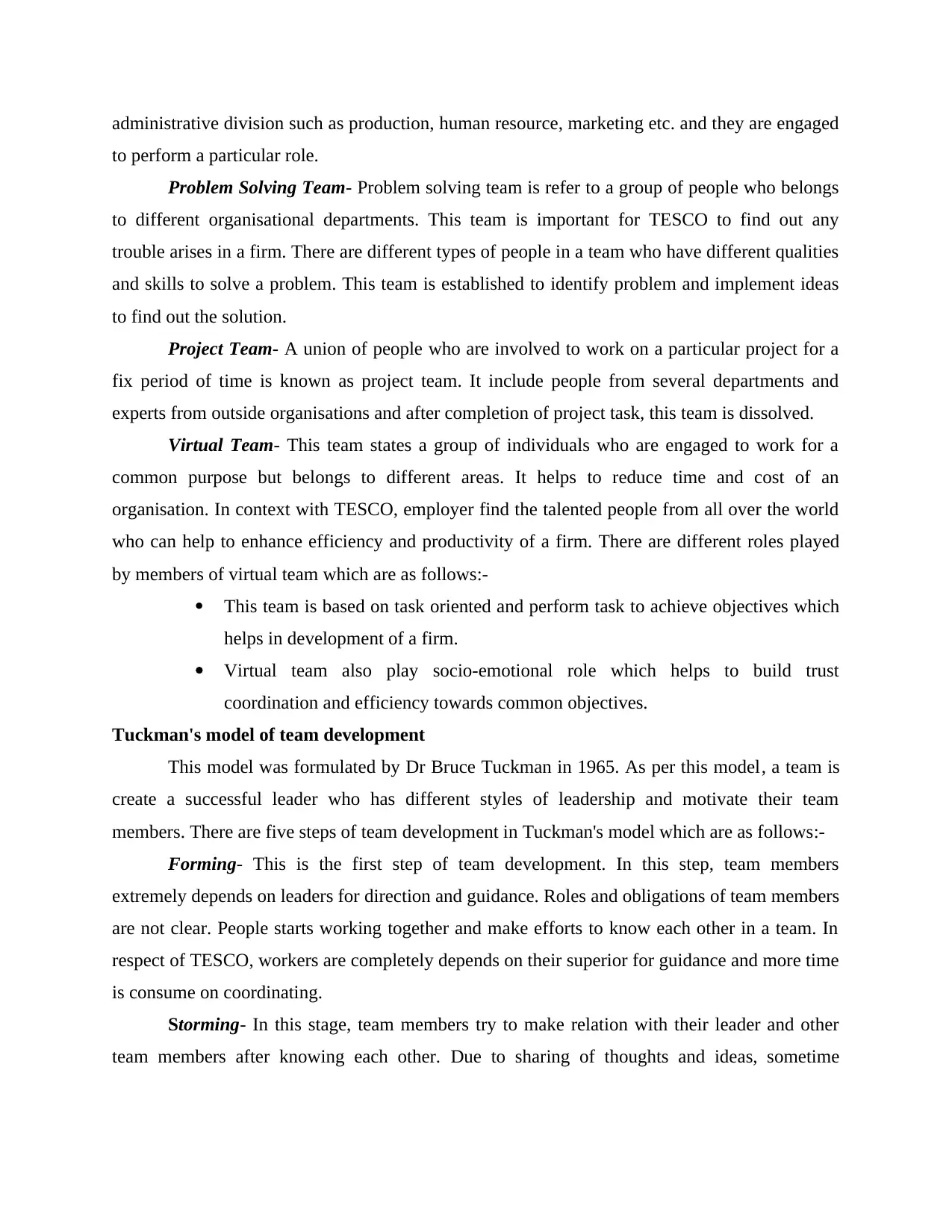
administrative division such as production, human resource, marketing etc. and they are engaged
to perform a particular role.
Problem Solving Team- Problem solving team is refer to a group of people who belongs
to different organisational departments. This team is important for TESCO to find out any
trouble arises in a firm. There are different types of people in a team who have different qualities
and skills to solve a problem. This team is established to identify problem and implement ideas
to find out the solution.
Project Team- A union of people who are involved to work on a particular project for a
fix period of time is known as project team. It include people from several departments and
experts from outside organisations and after completion of project task, this team is dissolved.
Virtual Team- This team states a group of individuals who are engaged to work for a
common purpose but belongs to different areas. It helps to reduce time and cost of an
organisation. In context with TESCO, employer find the talented people from all over the world
who can help to enhance efficiency and productivity of a firm. There are different roles played
by members of virtual team which are as follows:-
This team is based on task oriented and perform task to achieve objectives which
helps in development of a firm.
Virtual team also play socio-emotional role which helps to build trust
coordination and efficiency towards common objectives.
Tuckman's model of team development
This model was formulated by Dr Bruce Tuckman in 1965. As per this model, a team is
create a successful leader who has different styles of leadership and motivate their team
members. There are five steps of team development in Tuckman's model which are as follows:-
Forming- This is the first step of team development. In this step, team members
extremely depends on leaders for direction and guidance. Roles and obligations of team members
are not clear. People starts working together and make efforts to know each other in a team. In
respect of TESCO, workers are completely depends on their superior for guidance and more time
is consume on coordinating.
Storming- In this stage, team members try to make relation with their leader and other
team members after knowing each other. Due to sharing of thoughts and ideas, sometime
to perform a particular role.
Problem Solving Team- Problem solving team is refer to a group of people who belongs
to different organisational departments. This team is important for TESCO to find out any
trouble arises in a firm. There are different types of people in a team who have different qualities
and skills to solve a problem. This team is established to identify problem and implement ideas
to find out the solution.
Project Team- A union of people who are involved to work on a particular project for a
fix period of time is known as project team. It include people from several departments and
experts from outside organisations and after completion of project task, this team is dissolved.
Virtual Team- This team states a group of individuals who are engaged to work for a
common purpose but belongs to different areas. It helps to reduce time and cost of an
organisation. In context with TESCO, employer find the talented people from all over the world
who can help to enhance efficiency and productivity of a firm. There are different roles played
by members of virtual team which are as follows:-
This team is based on task oriented and perform task to achieve objectives which
helps in development of a firm.
Virtual team also play socio-emotional role which helps to build trust
coordination and efficiency towards common objectives.
Tuckman's model of team development
This model was formulated by Dr Bruce Tuckman in 1965. As per this model, a team is
create a successful leader who has different styles of leadership and motivate their team
members. There are five steps of team development in Tuckman's model which are as follows:-
Forming- This is the first step of team development. In this step, team members
extremely depends on leaders for direction and guidance. Roles and obligations of team members
are not clear. People starts working together and make efforts to know each other in a team. In
respect of TESCO, workers are completely depends on their superior for guidance and more time
is consume on coordinating.
Storming- In this stage, team members try to make relation with their leader and other
team members after knowing each other. Due to sharing of thoughts and ideas, sometime
⊘ This is a preview!⊘
Do you want full access?
Subscribe today to unlock all pages.

Trusted by 1+ million students worldwide
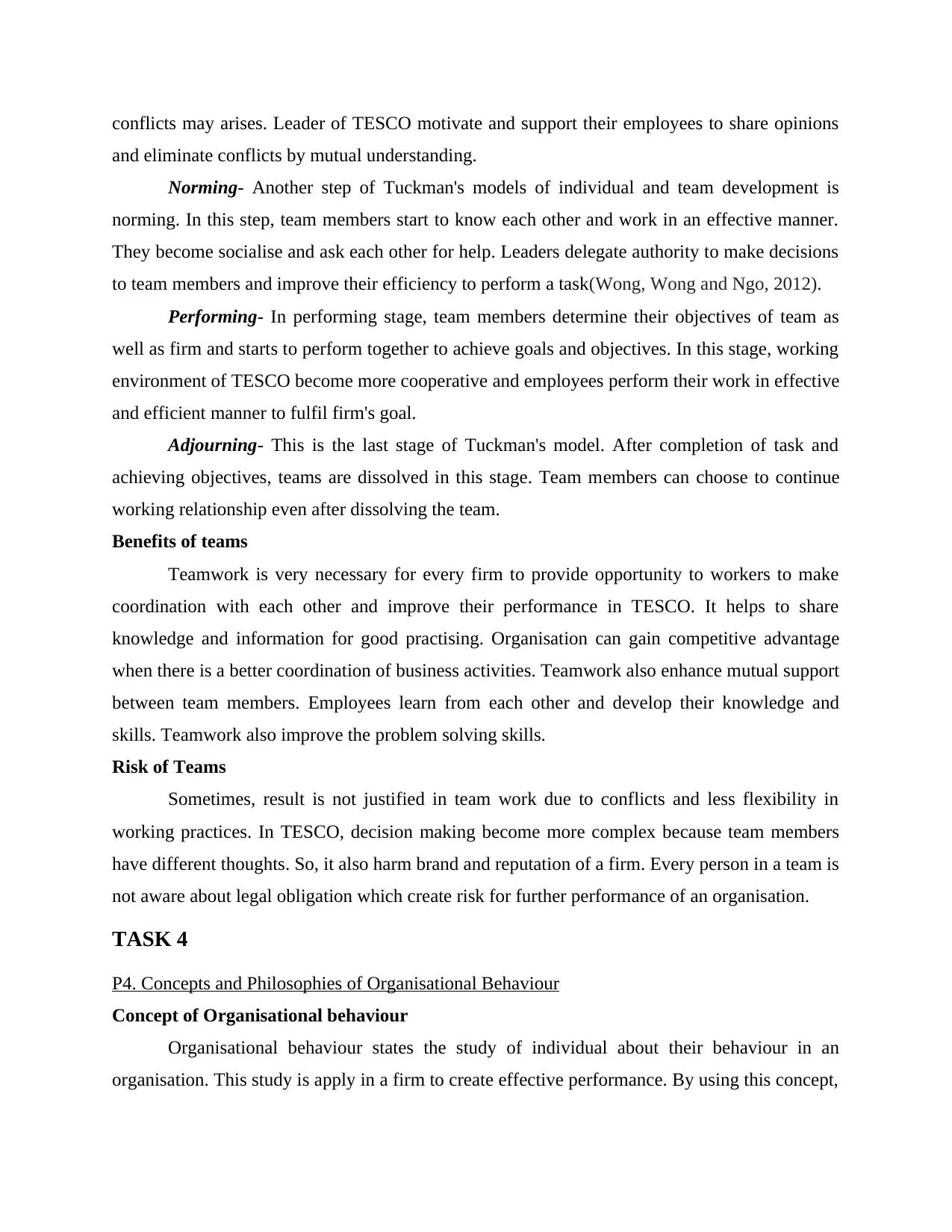
conflicts may arises. Leader of TESCO motivate and support their employees to share opinions
and eliminate conflicts by mutual understanding.
Norming- Another step of Tuckman's models of individual and team development is
norming. In this step, team members start to know each other and work in an effective manner.
They become socialise and ask each other for help. Leaders delegate authority to make decisions
to team members and improve their efficiency to perform a task(Wong, Wong and Ngo, 2012).
Performing- In performing stage, team members determine their objectives of team as
well as firm and starts to perform together to achieve goals and objectives. In this stage, working
environment of TESCO become more cooperative and employees perform their work in effective
and efficient manner to fulfil firm's goal.
Adjourning- This is the last stage of Tuckman's model. After completion of task and
achieving objectives, teams are dissolved in this stage. Team members can choose to continue
working relationship even after dissolving the team.
Benefits of teams
Teamwork is very necessary for every firm to provide opportunity to workers to make
coordination with each other and improve their performance in TESCO. It helps to share
knowledge and information for good practising. Organisation can gain competitive advantage
when there is a better coordination of business activities. Teamwork also enhance mutual support
between team members. Employees learn from each other and develop their knowledge and
skills. Teamwork also improve the problem solving skills.
Risk of Teams
Sometimes, result is not justified in team work due to conflicts and less flexibility in
working practices. In TESCO, decision making become more complex because team members
have different thoughts. So, it also harm brand and reputation of a firm. Every person in a team is
not aware about legal obligation which create risk for further performance of an organisation.
TASK 4
P4. Concepts and Philosophies of Organisational Behaviour
Concept of Organisational behaviour
Organisational behaviour states the study of individual about their behaviour in an
organisation. This study is apply in a firm to create effective performance. By using this concept,
and eliminate conflicts by mutual understanding.
Norming- Another step of Tuckman's models of individual and team development is
norming. In this step, team members start to know each other and work in an effective manner.
They become socialise and ask each other for help. Leaders delegate authority to make decisions
to team members and improve their efficiency to perform a task(Wong, Wong and Ngo, 2012).
Performing- In performing stage, team members determine their objectives of team as
well as firm and starts to perform together to achieve goals and objectives. In this stage, working
environment of TESCO become more cooperative and employees perform their work in effective
and efficient manner to fulfil firm's goal.
Adjourning- This is the last stage of Tuckman's model. After completion of task and
achieving objectives, teams are dissolved in this stage. Team members can choose to continue
working relationship even after dissolving the team.
Benefits of teams
Teamwork is very necessary for every firm to provide opportunity to workers to make
coordination with each other and improve their performance in TESCO. It helps to share
knowledge and information for good practising. Organisation can gain competitive advantage
when there is a better coordination of business activities. Teamwork also enhance mutual support
between team members. Employees learn from each other and develop their knowledge and
skills. Teamwork also improve the problem solving skills.
Risk of Teams
Sometimes, result is not justified in team work due to conflicts and less flexibility in
working practices. In TESCO, decision making become more complex because team members
have different thoughts. So, it also harm brand and reputation of a firm. Every person in a team is
not aware about legal obligation which create risk for further performance of an organisation.
TASK 4
P4. Concepts and Philosophies of Organisational Behaviour
Concept of Organisational behaviour
Organisational behaviour states the study of individual about their behaviour in an
organisation. This study is apply in a firm to create effective performance. By using this concept,
Paraphrase This Document
Need a fresh take? Get an instant paraphrase of this document with our AI Paraphraser
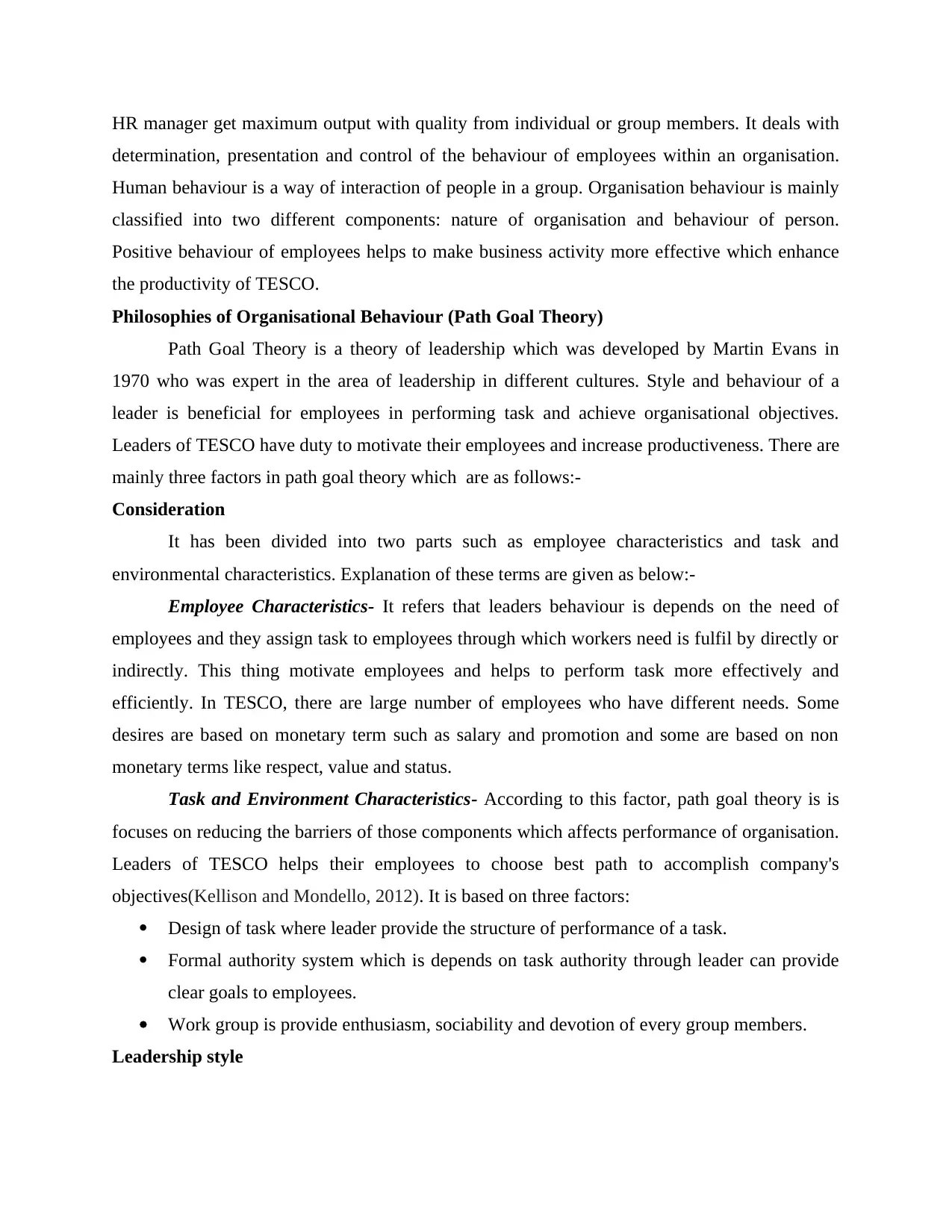
HR manager get maximum output with quality from individual or group members. It deals with
determination, presentation and control of the behaviour of employees within an organisation.
Human behaviour is a way of interaction of people in a group. Organisation behaviour is mainly
classified into two different components: nature of organisation and behaviour of person.
Positive behaviour of employees helps to make business activity more effective which enhance
the productivity of TESCO.
Philosophies of Organisational Behaviour (Path Goal Theory)
Path Goal Theory is a theory of leadership which was developed by Martin Evans in
1970 who was expert in the area of leadership in different cultures. Style and behaviour of a
leader is beneficial for employees in performing task and achieve organisational objectives.
Leaders of TESCO have duty to motivate their employees and increase productiveness. There are
mainly three factors in path goal theory which are as follows:-
Consideration
It has been divided into two parts such as employee characteristics and task and
environmental characteristics. Explanation of these terms are given as below:-
Employee Characteristics- It refers that leaders behaviour is depends on the need of
employees and they assign task to employees through which workers need is fulfil by directly or
indirectly. This thing motivate employees and helps to perform task more effectively and
efficiently. In TESCO, there are large number of employees who have different needs. Some
desires are based on monetary term such as salary and promotion and some are based on non
monetary terms like respect, value and status.
Task and Environment Characteristics- According to this factor, path goal theory is is
focuses on reducing the barriers of those components which affects performance of organisation.
Leaders of TESCO helps their employees to choose best path to accomplish company's
objectives(Kellison and Mondello, 2012). It is based on three factors:
Design of task where leader provide the structure of performance of a task.
Formal authority system which is depends on task authority through leader can provide
clear goals to employees.
Work group is provide enthusiasm, sociability and devotion of every group members.
Leadership style
determination, presentation and control of the behaviour of employees within an organisation.
Human behaviour is a way of interaction of people in a group. Organisation behaviour is mainly
classified into two different components: nature of organisation and behaviour of person.
Positive behaviour of employees helps to make business activity more effective which enhance
the productivity of TESCO.
Philosophies of Organisational Behaviour (Path Goal Theory)
Path Goal Theory is a theory of leadership which was developed by Martin Evans in
1970 who was expert in the area of leadership in different cultures. Style and behaviour of a
leader is beneficial for employees in performing task and achieve organisational objectives.
Leaders of TESCO have duty to motivate their employees and increase productiveness. There are
mainly three factors in path goal theory which are as follows:-
Consideration
It has been divided into two parts such as employee characteristics and task and
environmental characteristics. Explanation of these terms are given as below:-
Employee Characteristics- It refers that leaders behaviour is depends on the need of
employees and they assign task to employees through which workers need is fulfil by directly or
indirectly. This thing motivate employees and helps to perform task more effectively and
efficiently. In TESCO, there are large number of employees who have different needs. Some
desires are based on monetary term such as salary and promotion and some are based on non
monetary terms like respect, value and status.
Task and Environment Characteristics- According to this factor, path goal theory is is
focuses on reducing the barriers of those components which affects performance of organisation.
Leaders of TESCO helps their employees to choose best path to accomplish company's
objectives(Kellison and Mondello, 2012). It is based on three factors:
Design of task where leader provide the structure of performance of a task.
Formal authority system which is depends on task authority through leader can provide
clear goals to employees.
Work group is provide enthusiasm, sociability and devotion of every group members.
Leadership style
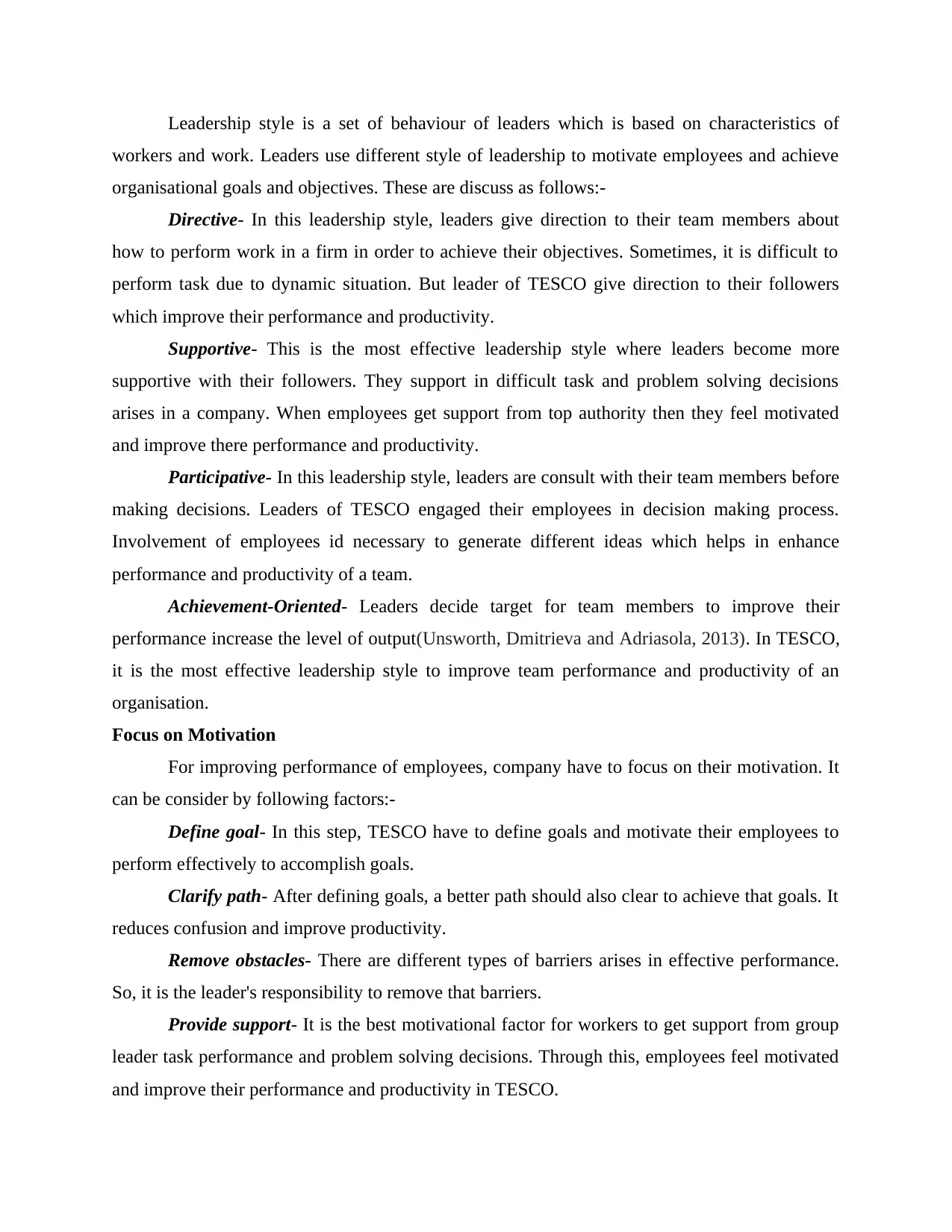
Leadership style is a set of behaviour of leaders which is based on characteristics of
workers and work. Leaders use different style of leadership to motivate employees and achieve
organisational goals and objectives. These are discuss as follows:-
Directive- In this leadership style, leaders give direction to their team members about
how to perform work in a firm in order to achieve their objectives. Sometimes, it is difficult to
perform task due to dynamic situation. But leader of TESCO give direction to their followers
which improve their performance and productivity.
Supportive- This is the most effective leadership style where leaders become more
supportive with their followers. They support in difficult task and problem solving decisions
arises in a company. When employees get support from top authority then they feel motivated
and improve there performance and productivity.
Participative- In this leadership style, leaders are consult with their team members before
making decisions. Leaders of TESCO engaged their employees in decision making process.
Involvement of employees id necessary to generate different ideas which helps in enhance
performance and productivity of a team.
Achievement-Oriented- Leaders decide target for team members to improve their
performance increase the level of output(Unsworth, Dmitrieva and Adriasola, 2013). In TESCO,
it is the most effective leadership style to improve team performance and productivity of an
organisation.
Focus on Motivation
For improving performance of employees, company have to focus on their motivation. It
can be consider by following factors:-
Define goal- In this step, TESCO have to define goals and motivate their employees to
perform effectively to accomplish goals.
Clarify path- After defining goals, a better path should also clear to achieve that goals. It
reduces confusion and improve productivity.
Remove obstacles- There are different types of barriers arises in effective performance.
So, it is the leader's responsibility to remove that barriers.
Provide support- It is the best motivational factor for workers to get support from group
leader task performance and problem solving decisions. Through this, employees feel motivated
and improve their performance and productivity in TESCO.
workers and work. Leaders use different style of leadership to motivate employees and achieve
organisational goals and objectives. These are discuss as follows:-
Directive- In this leadership style, leaders give direction to their team members about
how to perform work in a firm in order to achieve their objectives. Sometimes, it is difficult to
perform task due to dynamic situation. But leader of TESCO give direction to their followers
which improve their performance and productivity.
Supportive- This is the most effective leadership style where leaders become more
supportive with their followers. They support in difficult task and problem solving decisions
arises in a company. When employees get support from top authority then they feel motivated
and improve there performance and productivity.
Participative- In this leadership style, leaders are consult with their team members before
making decisions. Leaders of TESCO engaged their employees in decision making process.
Involvement of employees id necessary to generate different ideas which helps in enhance
performance and productivity of a team.
Achievement-Oriented- Leaders decide target for team members to improve their
performance increase the level of output(Unsworth, Dmitrieva and Adriasola, 2013). In TESCO,
it is the most effective leadership style to improve team performance and productivity of an
organisation.
Focus on Motivation
For improving performance of employees, company have to focus on their motivation. It
can be consider by following factors:-
Define goal- In this step, TESCO have to define goals and motivate their employees to
perform effectively to accomplish goals.
Clarify path- After defining goals, a better path should also clear to achieve that goals. It
reduces confusion and improve productivity.
Remove obstacles- There are different types of barriers arises in effective performance.
So, it is the leader's responsibility to remove that barriers.
Provide support- It is the best motivational factor for workers to get support from group
leader task performance and problem solving decisions. Through this, employees feel motivated
and improve their performance and productivity in TESCO.
⊘ This is a preview!⊘
Do you want full access?
Subscribe today to unlock all pages.

Trusted by 1+ million students worldwide
1 out of 15
Related Documents
Your All-in-One AI-Powered Toolkit for Academic Success.
+13062052269
info@desklib.com
Available 24*7 on WhatsApp / Email
![[object Object]](/_next/static/media/star-bottom.7253800d.svg)
Unlock your academic potential
Copyright © 2020–2026 A2Z Services. All Rights Reserved. Developed and managed by ZUCOL.





